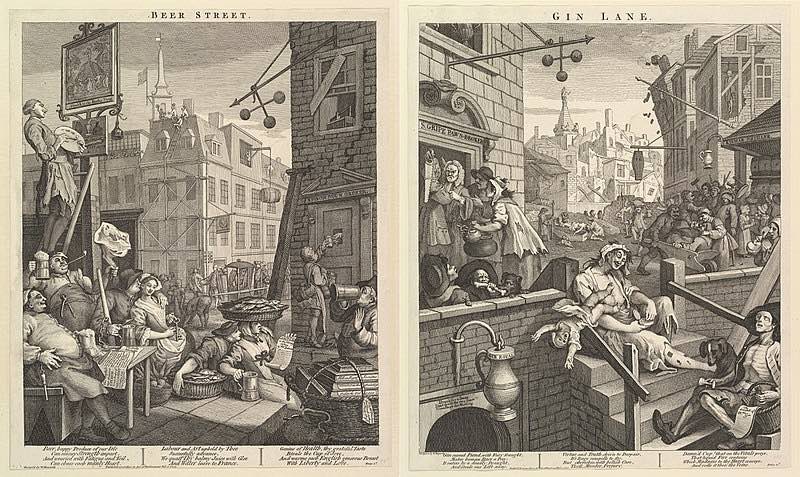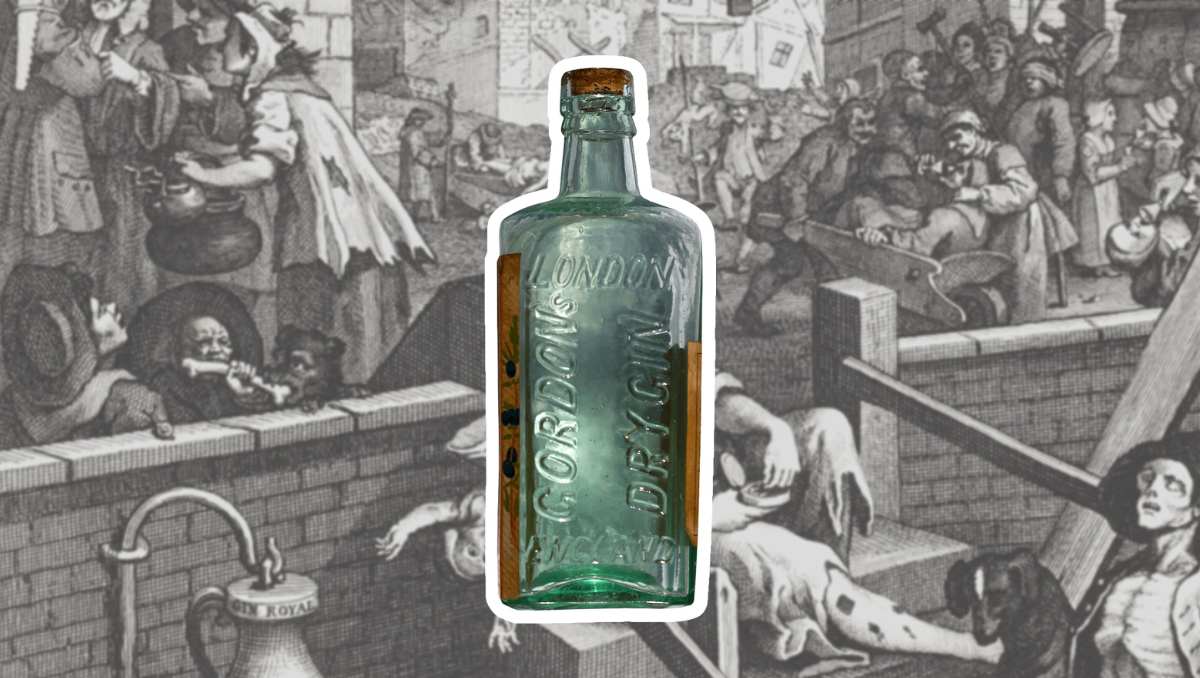The history of gin is linked closely to England - London in particular. That even shows in the most famous gin type, the London Dry Gin. But the origin of the juniper-flavored spirit lies despite all British influences in the Netherlands.
It was a Dutchman who brought the juniper-infused liquor to the British Island. Follow us on a journey from genever to gin, learn how the spirit has established itself in England, and what "Gin Craze" means.
General knowledge about the history of Gin
Gin, as we know it today, is a strong spirit of at least 37,5% ABV flavored with juniper and other botanicals. It's available in many different types, with London Dry being the most popular.
The term gin is a short form of the English word genever or variations of the word in other languages like French (genièvre) and Dutch (jenever). Ultimately, all are derivations from the Latin word for juniper - Juniperus.
Like most traditional spirits and liqueurs, the roots of gin reach far back, to the eleventh century when it started as some form of medicine due to the healing properties of juniper.
It is a refined version of the Dutch genever and became the national alcoholic drink of England during the reign of William of Orange. But let's start at the beginning.
The Origin
1270 was the first time jenever was referred to in written form in a Dutch encyclopedia called Der Naturen Bloeme (the flower of nature") by Jacob van Maerlant.
This collection of 13 books itself is only a shortened and translated version of the Latin Original De Natura Rerum. [1] The author explains that boiling juniper berries in water can treat abdominal pain. Boiling then in wine, in turn, would relieve cramps.
A few hundred years later, genever, the predecessor of gin, was invented in the Netherlands. Franciscus Sylvius is often mistakenly called the inventor of genever. However, he lived from 1614 to 1672, and old records from the Eighty Years' War of 1585 show that the Dutch were already drinking jenever in those days.
The calming effect of the juniper-flavored spirit helped the soldiers before the battle. That is also said to be the basis for the famous term Dutch Courage.
How Gin came to England
Gin, the British answer to genever, was first produced in the early 1600s and was originally consumed as medicine. The rise in popularity of Gin in England is closely linked to William of Orange. The monarch with Dutch ancestry became King of England, Scotland, and Ireland in 1689.
When he set up import restrictions on French Brandy, people turned to gin, making it the most popular spirit almost overnight. Combined with another new law, this led to what is now known as the Gin Craze.
The Gin Craze
In the early 1700s, William of Orange heavily taxed French Brandy but at the same time allowed unlicensed production and distillation of Gin. Thousands of Gin distilleries and shops popped up all over England, which kicked off the Gin Craze.
Unlicensed production made the spirit more affordable than any other alcoholic beverage. The low price and ready availability quickly made gin the alcohol of the poor and soon caused a series of social and societal problems due to overconsumption. By the way, beer was regarded as healthy and adequate for drinking in large volumes.
A famous Illustration by William Hogarth called "Beer Street and Gin Lane" translated that into pictures and eventually brought about the so-called Gin Act. It was a collection of bills, laws, and regulations to control and limit gin consumption in the country.

The gist of the Gin Act
The Gin Act was compiled from five different Acts dating back to 1729, 1736, 1743, 1747, and 1751. In 1729, the first Gin Act increased the retail taxes heavily.
In the Gin Act of 1736, the government implemented a costly license for gin retailers, which was reduced in the Act of 1743, along with a ban on distillers selling directly to end customers.
The Gin Act of 1747 increased taxes on gin again. This increased duty strongly reduced the gin demand as the spirit became more and more expensive.
Finally, the Act of 1751 also prohibited distillers to trade with non-licensed merchants, making it even harder for producers to sell their distillate.
The results were higher taxes and a regulated sale of gin to exclusively licensed stores. Riots in the streets of England were unavoidable but, in the end, did not change the government's decision.
Craft Gin Revolution
A few innovative British gin brands aiming to reinvent the juniper-flavored grain spirit drove the renaissance of gin. -Hendrick's Gin and Sipsmith among them. But what really kicked off the craft gin hype was a change of legislation in England from 2008.
Smaller distilleries challenged a law dating back to the 1800s favoring large gin producers. This law required that gin producers needed a massive 18 hectoliters of stills. Entirely out of reach for small producers.
This statute was finally reversed in 2008, and suddenly countless new gin producers shot out of the ground; -The gin renaissance, or second Gin Craze started.
People in Britain re-discovered gin and its most famous vehicle, the Gin and Tonic. Soon after, other European countries followed, above all, Spain, Portugal, Germany, and Italy. In 2023, the gin market is still in rapid growth, especially the premium gin section.
By the way, to touch on the royals quickly: the favorite drink of the late Queen Elisabeth II and her mother - Queen Mum - used to the Dubonnet with Gin. According to multiple "sources close to the family", Queen Mum drank that on a daily basis - hence the name of this cocktail is Queen Mother.

